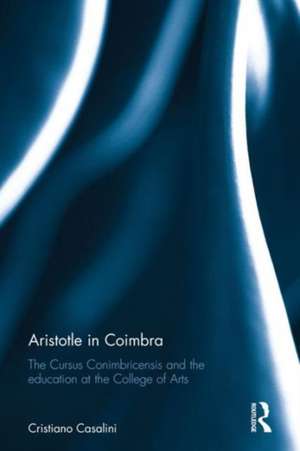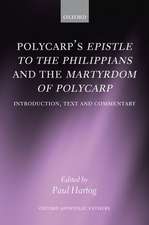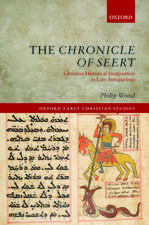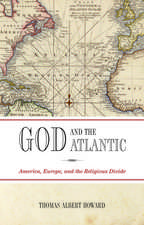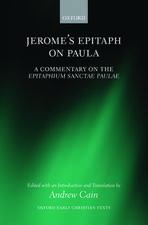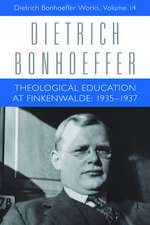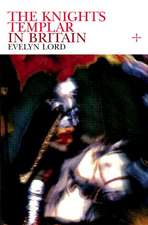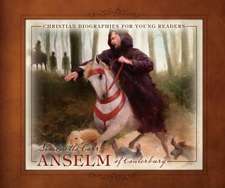Aristotle in Coimbra: The Cursus Conimbricensis and the education at the College of Arts
Autor Cristiano Casalinien Limba Engleză Hardback – 5 oct 2016
The first complete philosophical textbook published by a Jesuit college, the Cursus Conimbricensis (1592–1606) was created by some of the most renowned early Jesuit philosophers and comprised seven volumes of commentaries and disputations on Aristotle’s writings, which had formed the foundation of the university philosophy curriculum since the Middle Ages. In Aristotle in Coimbra, Cristiano Casalini demonstrates the connection between educational practices in a sixteenth-century college and the structure of a scholastic philosophical commentary, providing insight into this particular form of late-scholastic Aristotelianism through historiographical discourse.
This book provides both a narrative of the historical background behind the publication of the Cursus and an analysis of the major philosophical and educational issues addressed by its seven volumes. It is valuable reading for all those interested in intellectual history, the history of education and the history of philosophy.
| Toate formatele și edițiile | Preț | Express |
|---|---|---|
| Paperback (1) | 324.90 lei 43-57 zile | |
| Taylor & Francis – 29 aug 2022 | 324.90 lei 43-57 zile | |
| Hardback (1) | 1109.42 lei 43-57 zile | |
| Taylor & Francis – 5 oct 2016 | 1109.42 lei 43-57 zile |
Preț: 1109.42 lei
Preț vechi: 1352.96 lei
-18% Nou
Puncte Express: 1664
Preț estimativ în valută:
212.35€ • 230.74$ • 178.49£
212.35€ • 230.74$ • 178.49£
Carte tipărită la comandă
Livrare economică 21 aprilie-05 mai
Preluare comenzi: 021 569.72.76
Specificații
ISBN-13: 9781472464101
ISBN-10: 1472464109
Pagini: 206
Dimensiuni: 156 x 234 x 16 mm
Greutate: 0.46 kg
Ediția:1
Editura: Taylor & Francis
Colecția Routledge
Locul publicării:Oxford, United Kingdom
ISBN-10: 1472464109
Pagini: 206
Dimensiuni: 156 x 234 x 16 mm
Greutate: 0.46 kg
Ediția:1
Editura: Taylor & Francis
Colecția Routledge
Locul publicării:Oxford, United Kingdom
Cuprins
Preface by John W. O’Malley
Acknowledgements
Introduction
1 – The Gouveia affair
2 – A province committed to education
3 – The Cursus
4 – The problem of the teacher
5 – The problem of the cause
5.1 - Specific metaphysics
5.2 - Secondary causes, ulterior motives
5.3 - Hazards and probabilities
Bibliography
Index
Acknowledgements
Introduction
1 – The Gouveia affair
2 – A province committed to education
3 – The Cursus
4 – The problem of the teacher
5 – The problem of the cause
5.1 - Specific metaphysics
5.2 - Secondary causes, ulterior motives
5.3 - Hazards and probabilities
Bibliography
Index
Notă biografică
Cristiano Casalini teaches the history of education at the University of Parma. He has worked on critical texts and commentaries of sixteenth and seventeenth-century classics of education, especially in and around the Jesuit order. With Claude Pavur SJ he co-edited Jesuit Pedagogy (1540–1616): A Reader (2016). He is currently a Visiting Fellow at the Institute for Advanced Jesuit Studies and a Visiting Professor at the Lynch School of Education, both at Boston College.
Recenzii
Aristotle in Coimbra received the Joaquim de Carvalho Award, 2016, from the University of Coimbra.
Descriere
Aristotle in Coimbra is the first book to cover the history of both the College of Arts in Coimbra and its most remarkable cultural product, the Cursus Conimbricensis, examining early Jesuit pedagogy as performed in one of the most important colleges run by the Society of Jesus in the sixteenth century.
This book provides both a narrative of the historical background behind the publication of the Cursus and an analysis of the major philosophical and educational issues addressed by its commentaries and disputations on Aristotle's writings. It is valuable reading for all those interested in intellectual history, the history of education and the history of philosophy.
This book provides both a narrative of the historical background behind the publication of the Cursus and an analysis of the major philosophical and educational issues addressed by its commentaries and disputations on Aristotle's writings. It is valuable reading for all those interested in intellectual history, the history of education and the history of philosophy.
